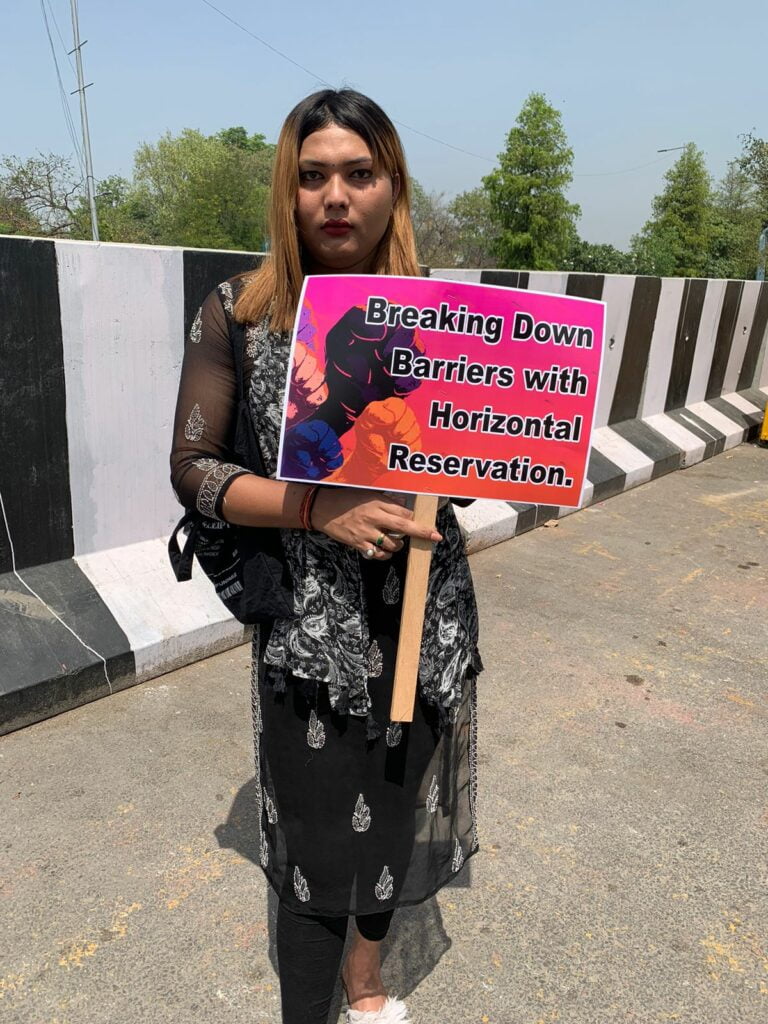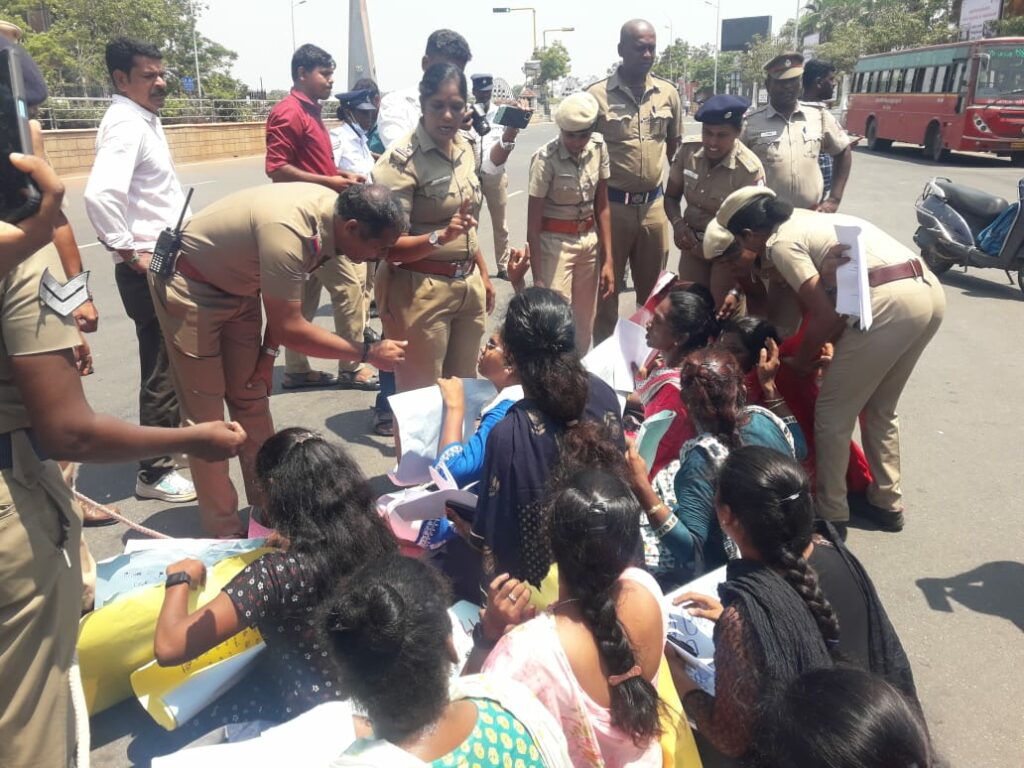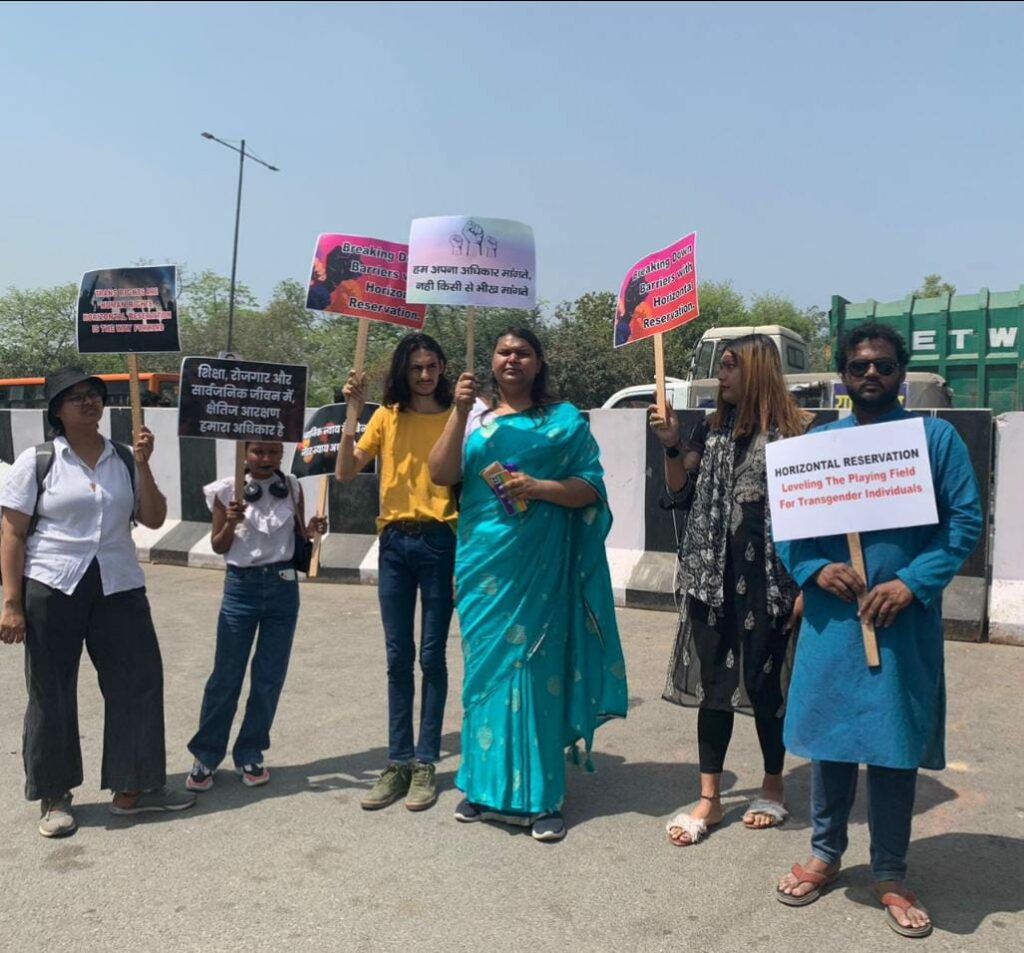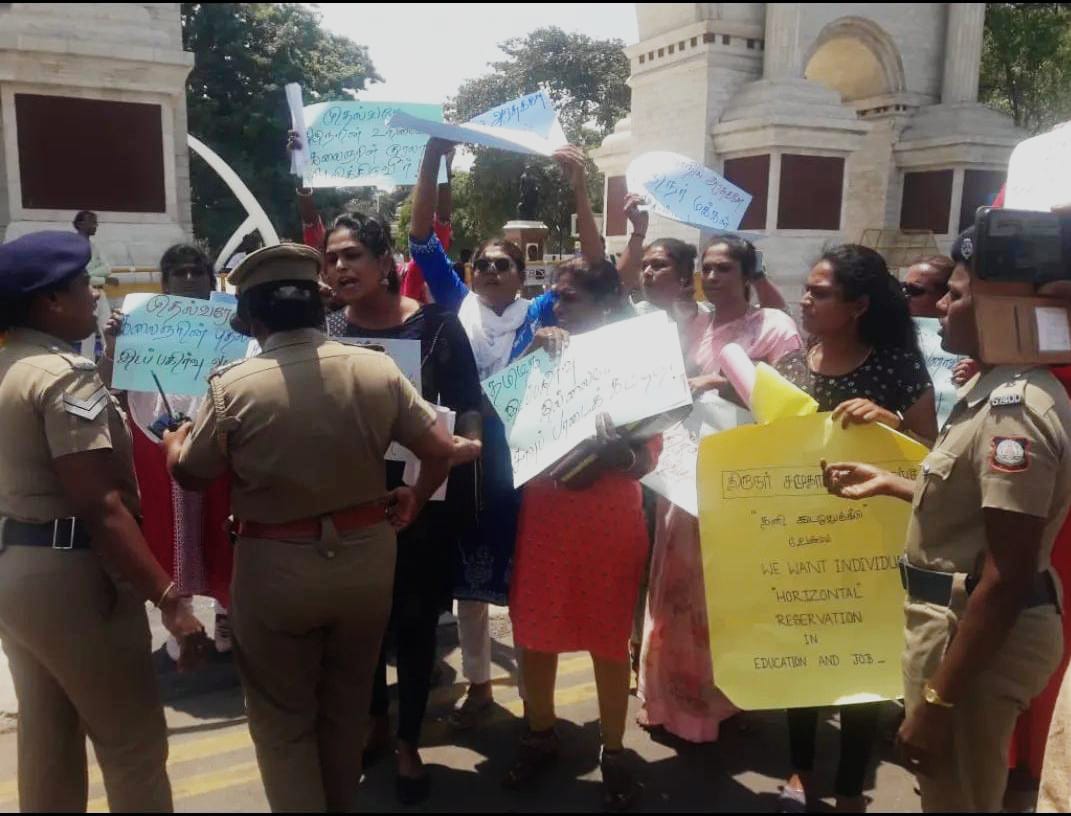The plea filed by the founder of The Trans Rights Now Collective, Grace Banu, and members of the collective had demanded that the government of Tamil Nadu provide horizontal reservation for transgender persons in education and public employment.
The basis of the plea remains to be the historic NALSA judgement of 2014 which directs governments to ensure reservation to trans persons.
“Another important aspect of this policy which needs to be kept in mind is that reservation does not mean the lack of competition; it is only a foot in the door and access to a queue does not mean that one will get a particular seat because they are more marginalised. All categories have diff cut-offs, thereby different people will have different access.”
Kanmani Ray
As the apex court in India hears the petitions to extend marriage equality to the LGBTQIA+ community, the question of the extension of opportunity to seek livelihood and dignity through the provision of horizontal reservations is assuming renewed momentum.

Protests were staged across three Indian cities, in Chennai, Delhi and Mumbai last week with the demand to implement the provisions of the NALSA judgement.
The current process of reservations for marginalised identities is known as vertical reservations– this form of reservation extends to the Scheduled castes, Scheduled Tribes and the Other Backward Classes. In 2021, the Centre moved a Cabinet note to include transgender persons in the list of OBCs. This policy decision has been described as one which is restrictive as it does not truly represent the multi-pronged intersectional nature of oppression that a trans person can face.
The current process of reservations for marginalised identities is known as vertical reservations– this form of reservation extends to the Scheduled castes, Scheduled Tribes and the Other Backward Classes. In 2021, the Centre moved a Cabinet note to include transgender persons in the list of OBCs. This policy decision has been described as one which is restrictive as it does not truly represent the multi-pronged intersectional nature of oppression that a trans person can face.
The clubbing of trans persons within the OBC category invisibalises caste differences and ignores the diversities that exist within the trans community, as pointed out by activists such as Banu who have consistently argued against the homogenous nature of this approach.
Also Read: Maybe A Biased Queer Judge Is All We Need: Justice For Saurabh Kirpal
Banu states the transgender community has caste divisions within; for example, a transgender person could also be Dalit. Therefore, the existing system restricts those belonging to SC/ST categories. This means that they would not be able to claim their right to reservation under both SC/ST and transgender, despite belonging to both communities. Moreover, the existing provisions mean that trans persons would have to continue to compete with other OBCs to be able to find a spot in educational institutions or jobs.
“On the legal side–currently one state has horizontal reservations which is Karnataka, however, that is limited to jobs. It does not extend to educational institutions. As a matter of right, we need guaranteed space in all educational institutions and public sector jobs at all levels. NALSA judgement in its operative part says treat all transgender persons as socially educationally backward classes, in the latter part of the judgement calls for an extension of this reservation.”
Kanmani Ray
Discussing this, trans activist and lawyer Kanmani Ray says, “On the legal side, currently one state has horizontal reservations which is Karnataka, however, that is limited to jobs. It does not extend to educational institutions. As a matter of right, we need guaranteed space in all educational institutions and public sector jobs at all levels. NALSA judgement in its operative part says treat all transgender persons as socially educationally backward classes, in the latter part of the judgement calls for an extension of this reservation.”
However, the court is not an executive body it is a judicial body, and it can only recommend and suggest or direct the government. The government in Tamil Nadu wherein hundreds have written examinations for the public service commissions and teacher entrance exams among others. Despite scoring good marks and passing, the candidates will not be able to secure a position because of the lack of horizontal reservations, because the state in aiming to implement the directive of the NALSA judgement has put all transgender persons in the OBC category– which then SC/ST trans persons to choose.”
They add, “Another important aspect of this policy which needs to be kept in mind is that reservation does not mean the lack of competition; it is only a foot in the door and access to a queue does not mean that one will get a particular seat because they are more marginalised. All categories have diff cut-offs, thereby different people will have different access.”

The demand for horizontal reservations, therefore, cuts through various categories to provide a separate category of reservations altogether in order to provide representation and affirmative action to all trans persons. A policy brief by the Center for Law and Policy Research (CLPR) notes that, Horizontal reservations cut across all caste categories in a bid to provide for separate reservations within each vertical SC/ST/OBC/General category. This means that 1% of ST, SC, OBC, and general merit seats each would be reserved for transgender persons.
Also Read: Muslim Women In Indian Politics: Reservation Proposed by the AIMMM
Currently, only one state in India, the state of Karnataka provides 1% reservation for transgender persons in employment for civil services posts across caste categories. On August 18th 2021, the Karnataka High Court also ordered the Government to consider issuing an advisory to all state public corporations and statutory bodies to also make provisions for similar reservations. The implementation of the policy stemmed from a Karnataka government notification calling for recruitment to the state police called for the filling up of posts from men and women, and did not have a ‘transgender’ category. While the government aimed to provide reservations under the OBC category it was demanded that horizontal reservations across castes must be provided instead.
“In Karnataka, the rules have been amended to ensure horizontal reservations to trans persons. We filed an application in the Supreme Court to modify the NALSA judgement so that reservation could be provided which is horizontal. We have been asked to appeal to the High Court. We don’t see reservations for trans persons implemented anywhere else. The big battle is that and how we can overcome it, is if we give a specific percentage to implement this. The movement from the trans community is very strong but I feel that the government has not even understood why this is demanded. The onus is on both the central and the state governments.”
Jayna Kothari
Jayna Kothari, Senior Counsel, representing Grace Banu states, “In Karnataka, the rules have been amended to ensure horizontal reservations to trans persons. We filed an application in the Supreme Court to modify the NALSA judgement so that reservation could be provided which is horizontal. We have been asked to appeal to the High Court. We don’t see reservations for trans persons implemented anywhere else. The big battle is that and how we can overcome it, is if we give a specific percentage to implement this. The movement from the trans community is very strong but I feel that the government has not even understood why this is demanded. The onus is on both the central and the state governments.”

The movement to demand horizontal reservations has spanned over a decade. Many like activist Jane Kaushik highlight the ground realities.
Activist and teacher, Jane Kaushik was reportedly fired from her job over the revelation of her identity. She says, “I was fired from my job, I was discriminated upon and unfairly treated, this is the everyday reality. So, the issue of horizontal reservations for us is a key human rights issue as well.”
“What we need is a statute which specifically provides for horizontal reservations for trans persons and gender non-conforming persons in the fields of public employment and education. Such an approach is sensitive towards the experiences of gender identity, caste and other ways in which they could be discriminated upon. Another important aspect in this discussion is the movement for the demand of a caste census, Bihar for example has said that a trans person will be put under the OBC category that should be vehemently opposed and is being opposed. It highlights the lack of understanding on gender and sexuality, caste and other forms of marginalisation which goes to the root of the matter.”
Rohin Bhatt
The movement for the implementation of horizontal reservations is ongoing both on the ground and legally.

Lawyer Rohin Bhatt states, “What we need is a statute which specifically provides for horizontal reservations for trans persons and gender non-conforming persons in the fields of public employment and education. Such an approach is sensitive towards the experiences of gender identity, caste and other ways in which they could be discriminated upon. Another important aspect in this discussion is the movement for the demand of a caste census, Bihar for example has said that a trans person will be put under the OBC category that should be vehemently opposed and is being opposed. It highlights the lack of understanding on gender and sexuality, caste and other forms of marginalisation which goes to the root of the matter.”
Also Read: Women’s Reservation Bill Is Not A Joke! Examining The Need For Quotas Within The Quota




